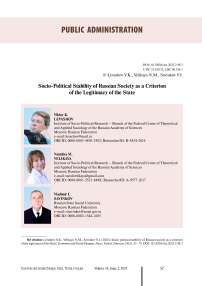Socio-political Stability of Russian Society as a Criterion of the Legitimacy of the State
Автор: Levashov V.K., Velikaya N.M., Savinkov V.I.
Журнал: Economic and Social Changes: Facts, Trends, Forecast @volnc-esc-en
Рубрика: Public administration
Статья в выпуске: 2 т.18, 2025 года.
Бесплатный доступ
The paper uses the database of the all-Russian sociological monitoring “How are you, Russia?” to analyze the dynamics of socio-political stability of Russian society as a criterion and indicator of the legitimacy publicly expressed by citizens to the State, creating conditions for decent life in the present and future. By analyzing theoretical foundations of stability, we show the dialectical nature of sociopolitical stability, its predetermination by the nature of the social structure, distributive relations and the implementation of the principles of social justice in society. Based on the analysis of empirical information, we show the alienation of the majority of Russian citizens from the neoliberal government model, an expressed preference for choosing a socially oriented type of government, which leads to the people's demand for administrative socio-political management. The dynamics of satisfaction with the political system, the assessment by the population of the State's fulfillment of social, including constitutional guarantees, prove a high degree of stability of Russian society; however, this stability is based on only four factors: ethno-territorial; defense (trust in the Army); complete trust in the RF President (Vladimir Putin); social support of the population by the State, provided for in the Constitution. The factor analysis reveals the importance of various groups of contradictions in Russian society (economic, ethno-religious, class-related) that affect socio-political stability. We identify the sustainability risk zones associated with a low level of institutional trust in most government institutions and civil society structures. Based on the findings of the study, we put forward recommendations to strengthen the socio-political stability of Russian society and the State.
Socio-political stability of society, legitimacy of the state, social contradictions, trust in government institutions, constitutional guarantees, welfare state
Короткий адрес: https://sciup.org/147251364
IDR: 147251364 | УДК: 32.019.52 | DOI: 10.15838/esc.2025.2.98.3
Текст научной статьи Socio-political Stability of Russian Society as a Criterion of the Legitimacy of the State
The reported study was funded by Russian Science Foundation, project number 23-18-00438 “The Reserves of the Sustainable Socio-Political Development of Russian Society and the State in the Context of Strengthening of Traditional Values and Global Multi-Polarity”.
Issues related to the possibilities of political legitimation are constantly faced by researchers due to the fact that political elites in different countries are experiencing a lack of political legitimacy today, regardless of the forms of government, the practice of political communication and the level of civil society development (Hinsch, 2010; Callaghan, 2022; Mikhailova, 2023). The need for additional mechanisms of legitimation among government institutions increases in transitional evolutionary and crisis moments, when it is important to maintain manageability and sociopolitical stability.
In this case, public legitimacy is the most important indicator of the stability and effectiveness of the political system. The foundation of the legitimacy of the state is based on the conviction of citizens that their well-being depends on maintaining the existing order in society, when the state expresses the interests of citizens, and the government secures the order not only using coercive measures, but also ensuring political participation of the population. In the postmodern era, scientists increasingly face issues related to the manipulative nature of modern legitimation practices (Omelchenko, Gasratova, 2015, p. 38; Sacca, Velikaya, 2024), when a person “only periodically ‘approaches’ the power-political order using such procedures as elections, referendums, and opinion polls” (Martianov, 2009, p. 83).
At the same time, research on legitimacy has shifted in recent years from describing the axiological-normative foundations of legitimacy that define political identity to studying the frames of political communication, including on the basis of the evolution of the discourse “inclusion – exclusion” of violence and its transformation into the discourse of political legitimation as a distinction between “legitimate” and “illegitimate” coercion, the symbolic derivative of which is political legitimacy itself (Zavershinskiy, 2016, p. 6). In other words, the state, having a monopoly on legality, in the conditions of a democratic form of government does not force its decisions into public opinion, but, on the contrary, tries to integrate the opinion of society into its decisions, which ensures the effective implementation of its policies (Beshe-Golovko, 2011, p. 135). In general, most researchers agree with the position of J. Habermas, who considers the legitimation of government as the integration of a society, the majority of which supports the values and norms proclaimed by the government “in order to settle these claims, i.e. to show why existing institutions are worthy and competent to exercise legitimate authority in such a way that the values fundamental to the identity of society are realized” (Habermas, 2010, p. 183).
The authors consider legitimacy as the result of stable development of society and the state, the content of which is determined by a wide range of social and political factors (Levashov, Velikaya, 2021). The weight and significance of these factors vary in different historical periods, which can be assessed based on the results of monitoring studies.
The empirical base of the paper is data from the all-Russian sociological monitoring “How are you, Russia?” (Levashov et al., 2024) conducted by the Institute of Socio-Political Research of the Federal
Center of Theoretical and Applied Sociology of RAS (ISPR FCTAS RAS)1, which allows analyzing the dynamics of indicators relevant to the legitimacy of the state: trust in political institutions and political leaders, respect and obedience to the law, a shared system of values accepted by the majority and value-based worldviews, the existence of a consensus between the government and society on significant political and economic goals.
The theoretical concept of the sociological analysis of the stability of society
Consolidation is more often used to characterize the political life of a society than stability, although the latter is broader in content and more accurately reflects the dialectical nature of the structural and functional model of society. The stability concept is used to characterize not “perfection”, but the balance of social relations, taking into account their objective permanent inconsistency, the predictability of the evolutionary trend of contradictions and the compromise form of their resolution. Consolidation of society is the cohesion of citizens of the state based on the identity of values (Rutkevich, 2001; Levashov, 2003; Cohen, Arato, 2004; Sacc , Velikaya, 2024). In political research, the stability of a political system is defined as the ability to maintain its development in a given line (a planned trajectory) and stay in a given functioning mode, despite the impact of disturbances (Grishin, 2015), which is ensured by the ability of the government to make decisions and implement them without resorting to open violence (Varlamova, 2015).
In this research, the stability of the political system in the sociological aspect is considered as a conflict-free variability of socio-economic conditions of society, equivalent to the natural dynamics of the social and professional structure and distributive relations corresponding to the expectations of citizens, their perception of these relations as socially just. Unlike affective-mental consolidation (Popov, 2004), the dialectical stability of society allows for political pluralism in norms mediated by individual interests, and consensus in defining criteria for socially just distributive relations.
The dialectical inconsistency of the stability content of a particular structural and functional model of the state, both market-based and predominantly socially oriented, can be analyzed using practical and epistemological approaches. In terms of the practical component, the stability of the structural and functional model of the state is necessary for the accumulation of the economic and intellectual potential of society. However, dialectics presupposes the presence of two contradictory components which, in a multidirectional interaction, permanently generate the process of social development.
Scientifically, it would be incorrect to absolutize the stability of the political system, since the methods of political management in ensuring it can be oppositely disposed: either democracy, theocracy, or dictatorship. The authors consider the concept of stability, on the one hand, as a socio-economic community association into a social institution of a democratic state, organically incorporating social contradictions regulated by the state using political and economic methods to find a compromise. Institutional (Kushnir, 2023, pp. 134–140) and political (Teplyakov, 2010, pp. 239–241) aspects of regulating the balance of society and, accordingly, the state, are considered as methods that, as evidenced by social revolutions, are not always sufficient to ensure the stability of society.
In everyday consciousness, the understanding of the stability of the social organization of people is based on the concept of social justice of the distribution principles. The importance of such masses’ perception of their attitude toward the state as an indicator of its stability is much higher than the quantitative criteria of the economic component of distributive relations. An example of this is the long-term stability of the political organization of a Soviet society with a highly differentiated ethnic and confessional composition. From this perspective, the interpretation of the concept “state stability” may sound like the correspondence of political governance to the objective laws of social development and the understanding of the justice of the existing political order. This is how Aristotle understood it, considering the core of the balance of city states to be the observance of the principle of social justice (Aristotle, 1983, p. 603). According to Aristotle, this concept is closely related to the government policy of creating conditions for the increase in the share of the “middle stratum” in the total city state population: “... the welfare of the state is that its citizens possess medium but sufficient property; and in cases where some people own too much, while others have nothing, either extreme democracy, or oligarchy... or tyranny arises...” (Aristotle, 1983, p. 508)2.
On the occasion of classical capitalist states, the constitution became a codified form of stability of the political organization of society as a set of basic principles and regulatory laws for the voluntary association of citizens into a state of market relations. It is generally accepted that, politically, the constitution is a tool limiting state power and guaranteeing individual rights. Even if a law contains only institutional norms of codified law, without taking into account various interests of a citizen who is aware of the obligation to comply with prescribed legal norms, the person will still subjectively perceive these norms as securing his or her rights or in a broader aspect – ensuring social justice. However, the state cannot be right or wrong, good or bad for absolutely everyone, once and forever. Therefore, the question should be formulated as follows: does the state ensure the stability of society in these historical, political, economic and social contexts? If it does not, then there is a risk of social conflicts. If it does, then the issue of reproduction and maintenance of stability is resolved and society becomes stable within the structural and functional model that this state represents.
The classics of sociology also drew attention to the connection between the stability of society and legitimacy. In particular, D. Easton understood legitimacy precisely in this way – as an ability of the political system to cope with the issues of ensuring the stability of the system (Easton, 2000, pp. 319–321). The role of legitimacy in the process of maintaining the stability of the system was emphasized by M. Lipset, who considers political legitimacy as “the quality of a political system, as its ability to maintain the belief of the population and social groups in existing political institutions as best corresponding to the society” (Lipset, 2012, p. 42). The approach proposed by the authors to the research of legitimacy is based on an understanding of state legitimacy as the result of conscious scientific support of the dialectical process of stable socio-political development of relations between subjects and institutions of society and the state in the interests of citizens in the present and future (Levashov, 2023; Berezina et al., 2024, pp. 4–6).
Citizens delegate the right to choose methods and tools regulating the socio-political balance of relations in society, creating conditions for the profitable functioning of the economy to their representatives in government structures, while citizens deal with their “cares” without burdening themselves with the bureaucrats’ work that is paid by their taxes. Therefore, there should be indicators for monitoring the effectiveness of government acting on behalf of, in the interests of, and at the expense of citizens.
There is a concept of the state and government, but there are no “substances” of them – neither the state nor the government. The state is the people, and the government is the socio-political status of some of the people in the context of democracy. It is no coincidence that the modern stage of society development, determined by the influence of globalization and digitalization, has changed the configuration of civil society, which is losing its ideological interpretation “in terms of the market and proprietary individualism” (Lane, 2012, p. 99) and becomes an environment providing selfsustained dynamics, in which various informal networks of solidarity with various forms of support and mutually beneficial associations are intertwined. At the same time, the social roles of various population groups are differentiated by the social division of labor and its derivative, the principle of surplus product distribution. This principle changes in accordance with the growth of productivity of social labor and, consequently, the amount of the surplus product. For example, in a monarchical feudal state, the main part of the surplus product is expropriated, mainly in natural or in a mixed, natural-monetary form. With the introduction of private property as an inalienable right, a part of the surplus product is expropriated in monetary form as a “citizen tax” according to a unified principle and proportionally, which creates the illusion of social justice among citizens. This process is objective and contributes to the stability of a market state as a socio-political entity, as it harmonizes the contradictions between rural and urban areas, between intellectual and physical labor, between employees of civilian production enterprises and employees of defense enterprises and, in general, between the producing and dependent parts of the population.
A significant social contradiction between the population and the government as a political representative of the state is the contradiction between citizens and the bureaucracy, as mentioned by A. Tocqueville, analyzing the practice of democracy at the initial stage of the formation of the United States as a democratic state: “In aristocratic governments the individuals who are placed at the head of affairs are rich men, who are solely desirous of power. In democracies statesmen are poor, and they have their fortunes to make3. The consequence is that in aristocratic States the rulers are rarely accessible to corruption, and have very little craving for money; whilst the reverse is the case in democratic nations” (Tocqueville, 1992, p. 177).
Sociologically, the importance of the social division of labor as the natural basis of people’s cooperative aspirations was emphasized by E. Durkheim: “... the division of labor is the main, if not the only, source of social solidarity” (Durkheim, 1996, p. 69), and the solidarity produced by the social division of labor “... contributes to the general integration of society” (Durkheim, 1996, p. 71). The Constitution is the guarantee of this integration. However, if the constitution is given a purely socio-regulatory function, regardless of the form of government or other economically structured community, then it does not matter how it is called: law, code, decree, covenant, etc. In epistemology, a clear definition of concepts is required, otherwise the scientific reasoning is replaced by subjectively interpreted historical precedents.
The Constitution cannot be a law in itself, and although nowadays the constitution is called the basic law of the state, actually it is a set of principles that cannot be divided into subordinate acts. The nature of the constitution and the law differs: the constitution guarantees citizen’s rights, it does not just permit: it would be illogical to permit what a citizen possesses naturally. Citizens unite into the state, provided that their vital interests are guaranteed. This is a compromise that the government must agree to in order for the state to exist. And in this case, the issue of the stability of the compromise is relevant, as well as the ability to duly correct the principles of the relationship between the state and society. For example, studying the nature of the Constitution, Tocqueville admired the new principles of the civil society: “The general principles which are the groundwork of modern constitutions – principles which were imperfectly known in Europe, and not completely triumphant even in Great Britain, in the seventeenth century – were all recognized and determined by the laws of New England: the intervention of the people in public affairs, the free voting of taxes, the responsibility of authorities, personal liberty, and trial by jury, were all positively established without discussion” (Tocqueville, 1992, p. 51).
Sociologically, the analysis of the socioconsolidating effect of the Constitution of the state is carried out by considering the assessment by citizens of the premises that directly relate to their vital interests. Since the interests of citizens vary in form, an indicator of their consolidation can only be a unified subjective assessment made by the citizens themselves. This is also confirmed by the wide range of goals of socio-economic cooperation formulated in the Constitution. In particular, the state-consolidating role of the Constitution of the Russian Federation, contributing to the stability of the state, can be judged on the basis of the assessment by citizens of the implementation of state obligations to guarantee their fundamental rights and freedoms using the methods of applied sociology (Articles 6–48)4.
The range of guarantees that the state assumes, according to the Constitution of the Russian Federation, is great. Many guarantees related to social security could be omitted, but social funds cannot fully cover them due to the devaluation of savings in the context of high, prolonged inflation. Such a guarantee as the right to rest should be implemented by the labor union using an agreement with the employer, and not by the state. The guarantee of submitting appeals to state bodies contrasts the state and citizens, highlights the role of the state as a “caregiver”. In a rule-of- law state, industrial disputes should be resolved by arbitration, and civil disputes – by the court. Lip service is paid to guarantees of freedom of choice of profession, place and type of work. They were relevant during the Soviet period, when these rights were limited by residence registration: a villager could not go to work in the city or factory if there was no intention by the authorities. Currently, the limits of professional self-determination of citizens are set by the production technology, its market profitability, and the state can influence this only to a small extent, mainly by correcting the higher and vocational education systems and creating additional jobs within state (national) projects.
Empirical and sociological analysis of sociopolitical stability of society
In the empirical research of socio-political stability, various groups of indicators are used in
ISPR FCTAS RAS5: acceptance/rejection of the existing political order, trust/distrust in government institutions and constitutional political practices, civic and political activism, self-assessment of the financial situation, etc.
The dynamics of the “attitude toward the political system” allows us to note the expansion of the stability area that has developed in Russian society and the state of the political model. With the growing mass of citizens who fully support the configuration of the political system, the number of supporters of radical change has decreased. At the same time, the last three years have demonstrated a stable opinion of citizens regarding the possibilities of transforming the political system. Half of our citizens see existing problems and shortcomings, but consider reforms as a possible way to address them (Fig. 1).
Figure 1. Respondents’ attitude toward the political system of society (RF, % of respondents)
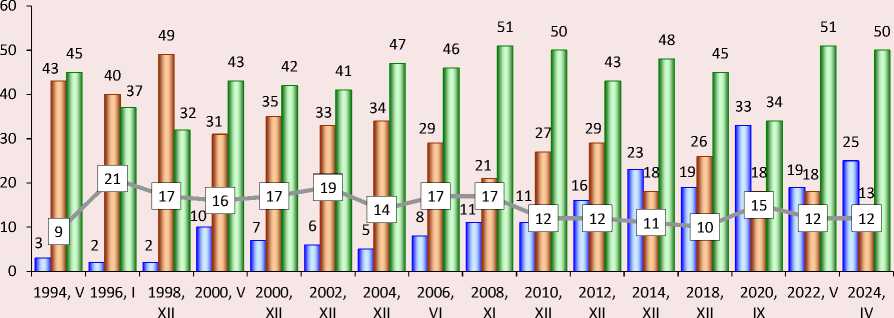
■ ■ I am completely satisfied with the political system of our society
■ ■ The political system should be radically changed
There are many problems, but reforms can address them жввв No answer
Source: (Levashov et al., 2024).
The key factor here remains the level of public trust in the government, political actors and policy decisions made by them, as well as in public structures, which allows us to consider institutional trust both as social capital and as a social resource that ensures social interaction (Sztompka, 2012). Empirically, this is confirmed by the correlation between the level of institutional trust and the attitude toward the political system (Berezina et al., 2024, pp. 86–109).6
Currently, the presidential election of the Russian Federation held in March 2024 can legitimately be considered as the most reliable indicator of the high stability of Russian society: voter turnout exceeded 70% and became the highest in the history of similar elections in the Russian Federation; voting for Vladimir Putin was almost 90%, which is also a historical record. The steady trend of consolidation of Russian society in the election of the President of the Russian Federation Vladimir Putin in 2024 is a natural phenomenon which originates from the period of the deepest and most severe socio-economic crisis and financial default in the late 1990s, which determined the actual resignation of Boris Yeltsin from the post of President of the Russian Federation (Fig. 2; Tab. 1).
Figure 2. Dynamics of the average monthly budget of a family of three6, USD
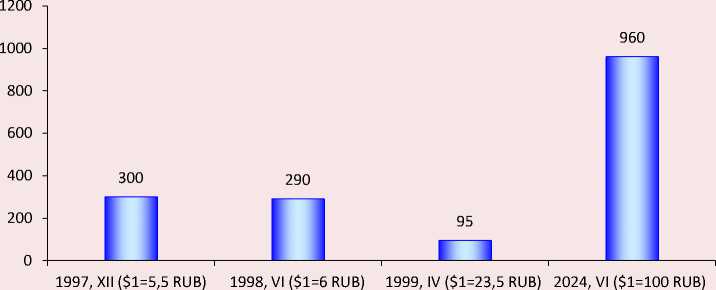
Source: (Sheregi, 2003; Levashov et al., 2024).
Table 1. Dynamics of the proportion of population groups by financial situation in the period before and after the financial default in the Russian Federation (August 1998), %
|
Population groups by financial situation |
June 1998 |
October 1998 |
January 1999 |
April 1999 |
June 2024 |
|
High income |
0.9 |
0.2 |
0.2 |
0.9 |
1.7 |
|
Middle income |
34.3 |
22.4 |
19.6 |
16.7 |
71.8 |
|
Low income |
54.5 |
57.4 |
59.6 |
57.3 |
14.8 |
|
Below the poverty line |
10.3 |
20.0 |
20.6 |
25.1 |
11.7 |
|
Total |
100 |
100 |
100 |
100 |
100 |
|
The poor, total |
64.8 |
77.4 |
80.2 |
82.4 |
26.5 |
Source: (Sheregi, 2003; Levashov et al., 2024).
Fig. 2 and Tab. 1 show the economic consequences of the 1998 financial crisis – the extreme polarization of society before 1999 in terms of wellbeing, which “echoed” in public opinion in the form of citizens’ trust in the executive and legislative authorities (Fig. 3).
The threat to the stability of society is manifested not only in the loss of citizens’ trust in the RF President (Boris Yeltsin) reaching almost zero in 1999, but also in the fact that trust in other executive and legislative authorities did not reach 20%. Only the proportion of citizens who trust the Russian army remained relatively high. It should be noted that the growth of citizens’ trust in executive and legislative authorities began only in 2000, and today the majority of citizens legitimately consider the RF President (Vladimir Putin) and the Russian Army to be the guarantors of the stability of the development of Russian society and the legitimacy of the state in the present and future.
At the same time, the civil consolidating effect on the stable socio-political development of civil society institutions, parties and the State Duma, public organizations and local authorities is still weak (Levashov et al., 2024, pp. 17–18). Most likely, one of the reasons for the low rates is not only the poor clarity and publicity of the results of their activities, but also the unsuccessful implementation of the following paragraph: “Local self-government bodies and state power bodies should be integrated in the unified system of public authority in the Russian Federation, and should cooperate to efficiently resolve tasks in the interests of population inhabiting the relevant territory”7.
Figure 3. Dynamics of the proportion of Russians who trust the executive and legislative authorities (RF, % of respondents)
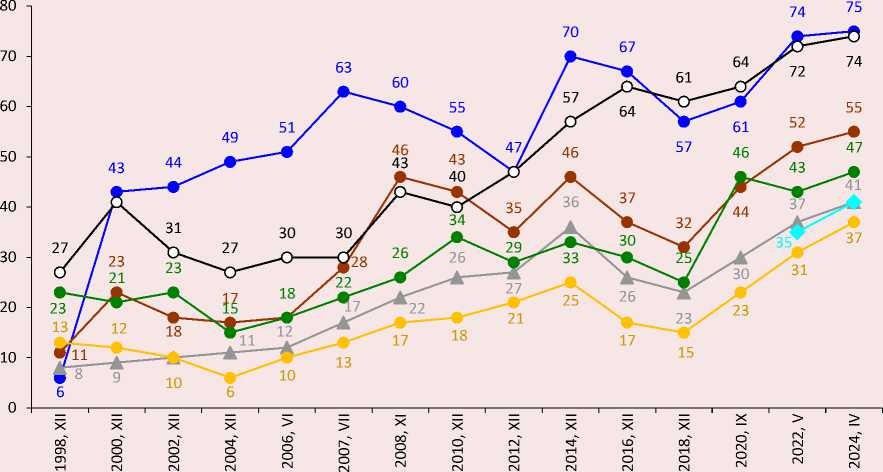
—•— RF President ♦ RF Government
—A— Federation Council • State Duma
Army —•— Heads of constituent entities
—•— Local government
Source: (Levashov et al., 2024).
During all the years of reforms in Russia, a structure of effective civil society institutions that could compare with the Soviet system of people’s deputies has not been created. Neither labor unions, nor non-governmental organizations, nor parties have become publicly effective instruments of social integration and solidarity of citizens. At the same time, in recent years, since the start of the special military operation, Russian citizens have demonstrated an increase in public trust in almost all government institutions, which objectively indicates the consolidation of both Russian society and the legitimacy of state authorities due to the socio-political situation of resistance to external threats (Tab. 2).
However, in 2024, there remains a significant gap between the public trust in the current RF President and other authorities. In particular, the level of trust in local and regional authorities is 30 points lower than in the RF President (Tab. 2). Such serious discrepancies in trust in institutions of political power lead to the development of a person-type regime (Popova, 2019), where regional and local authorities are integrated into a common hierarchical vertical subordination, and the president is in charge of the resolution of all issues, including at the local level (Velikaya, 2024). However, it obscures the long-term prospects for socio-political stability when it depends only on the attitude of citizens toward RF President Vladimir Putin.
There are a number of factors that are synchronous with the content of the constitution and directly affect the interests of the population. In particular, although the current RF Constitution does not specify the ideological and political system of the state, Russians are largely differentiated, by genetic predisposition or just keeping the way, in terms of their preference for the ideological and political system, gravitating either to socialism, which is perceived as a Welfare State, or to capitalism (Fig. 4).
Table 2. Dynamics of respondents’ attitude toward public structures and government institutions (answer option “I trust”) (RF, % of respondents, 2012–2024)
|
Public structures and government institution s |
2012, XII |
2014, VI |
2016, XII |
2021, VI |
2023, VI |
2024, IV |
Trust index (It) to 2024* |
|
trust |
trust |
trust |
trust |
trust |
trust |
||
|
RF President |
47 |
72 |
67 |
50 |
73 |
75 |
0.60 |
|
RF Government |
35 |
49 |
37 |
35 |
53 |
55 |
0.28 |
|
Federation Council |
27 |
38 |
26 |
27 |
39 |
41 |
0.09 |
|
State Duma |
21 |
27 |
17 |
23 |
34 |
37 |
-0.9 |
|
Executive Office of the RF President |
28 |
42 |
32 |
36 |
47 |
51 |
0.26 |
|
Security Council |
32 |
48 |
36 |
46 |
52 |
53 |
0.31 |
|
Police, judiciary, prosecution service |
18 |
21 |
17 |
25 |
37 |
36 |
-0.4 |
|
Army |
47 |
61 |
64 |
66 |
69 |
74 |
0.62 |
|
Heads of constituent entities |
29 |
36 |
30 |
39 |
50 |
47 |
0.19 |
|
Public Chamber |
23 |
29 |
19 |
29 |
35 |
35 |
0.07 |
|
Labor unions |
21 |
25 |
19 |
34 |
34 |
36 |
0.4 |
|
Church |
52 |
55 |
45 |
40 |
52 |
54 |
0.31 |
|
Parties, political movements |
22 |
19 |
15 |
20 |
22 |
26 |
-0.15 |
|
Non-governmental organizations |
31 |
29 |
21 |
37 |
35 |
47 |
0.11 |
|
Media |
26 |
24 |
17 |
22 |
27 |
31 |
-0.1 |
|
Local government |
- |
- |
- |
- |
41 |
41 |
0.5 |
Note: (-) – the question was not included in the survey .
*Trust index (It) is measured in the range [-1; 1]. The closer its value to 1, the higher the level of trust in the institution. The closer to -1, the lower.
Source: (Levashov et al., 2024); data from the Center for Strategic Social and Socio-Political Research of ISPR FCTAS RAS.
The significant disunity of Russians’ opinion on the preference for an ideological and political system (which determines distributive relations in the state) explains the lack of a description of an ideological and political system in modern constitutions of market states. Russia initiated the implementation of radically liberal market relations in the country, but the privatization of the economy in the 1990s was socially ineffective. As a result, the vast majority of the population had only their apartments privatized, which was not enough for a seed capital required for entrepreneurial activity. That is why the orientation toward socialism is most pronounced among the poor (Fig. 5).
Figure 4. The opinion of Russians about the society they would like to live in (RF, % of respondents, 1998–2024)
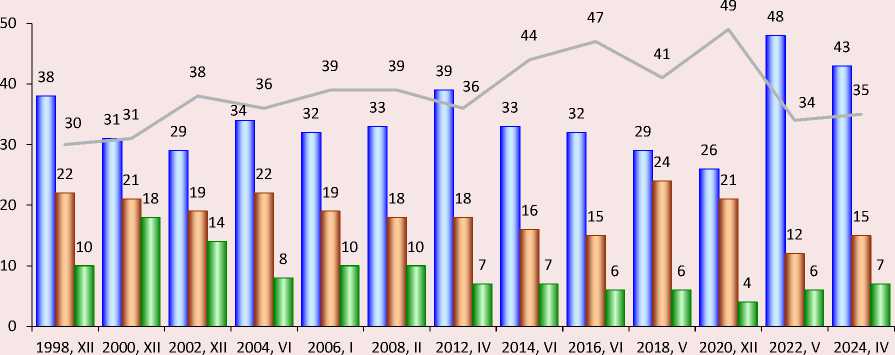
■ I In a socialist society
■ _ J In some other society
1 J In a capitalist society ^^^^^^^^M No answer
Source: (Levashov et al., 2024).
Figure 5. The opinion of representatives of groups with different financial situations about the society they would like to live in (RF, % of the respondents in 2024)
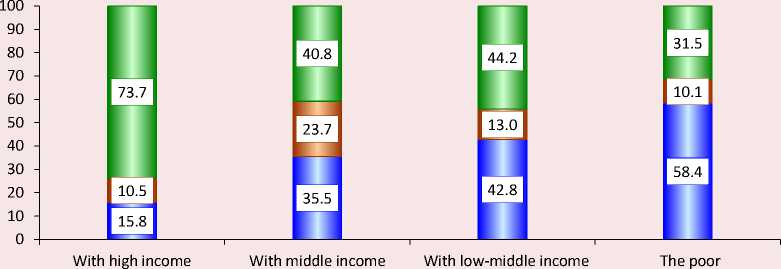
□ In a socialist society □ In a capitalist society □ No answer
Source: (Levashov et al., 2024).
The data in Figures 5 and 6 indicate that the majority of Russians are oriented toward a social, paternalistic state. It also follows from this that the ideological and political system of the Russian Federation today is not in itself consolidating for citizens: it does not divide purposefully, but supports the public consciousness regarding socio-economic reforms in an unstable state. The reliability of this statement is evidenced by the opinion of the respondents about whose interests the state primarily protects today (Fig. 6).
Given this public opinion, it is not surprising that 40% of citizens consider it advisable to nationalize all previously privatized enterprises, and another 45% – to nationalize part of these enterprises. Such a position of Russians is inconsistent with many of the targeted socially oriented parameters of the state economic policy aimed at developing stable market relations. One of the reasons for the rejection of the spontaneous neoliberal market by the population is the inactive participation of the small and medium-sized business communities in the social policy of the state.
Nevertheless, according to the research data, it is legitimate to currently consider the Russian state as quite stable. The factor analysis revealed that the main component of generating stability is the state policy on social guarantees. At the same time, guarantees of political freedoms are not essential in ensuring stability. Russian citizens traditionally combine the guarantees formulated in the RF Constitution into two associated groups: social guarantees and political guarantees (Fig. 7) 8.
Figure 6. Respondents’ opinion about whose interests the state protects today (RF, % of respondents in 2024)
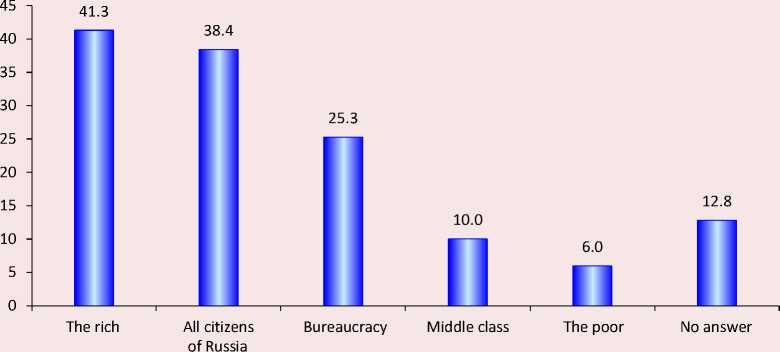
Source: (Levashov et al., 2024).
Figure 7. The factor scheme of citizens’ associations for constitutional guarantees
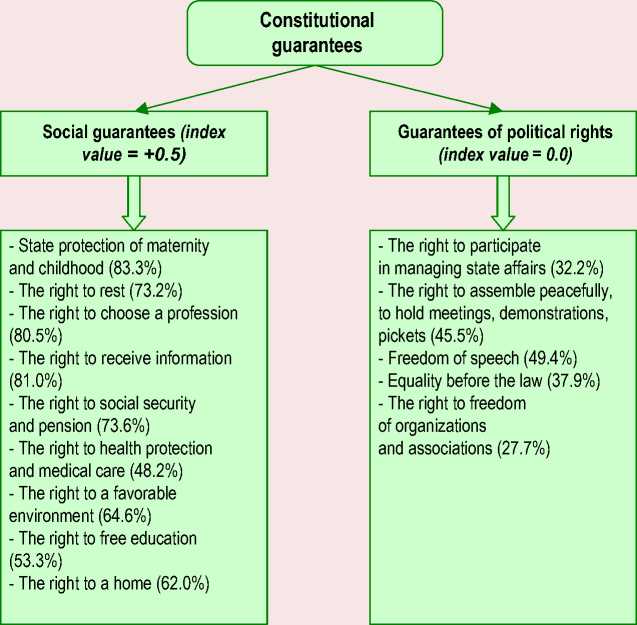
Compiled based on: (Levashov et al., 2024).
Based on the index values (in parentheses in the second row of units), it can be concluded that on average up to 80% of citizens are satisfied with how the state accomplishes its promises on social guarantees, and less than 50% are satisfied with how it fulfills political guarantees. These indicators vary for individual types of guarantees, so, at the end of the name of each type of guarantee, the proportion of respondents who believe that the state completely fulfills the relevant guarantee is indicated in parentheses (the third row of units).
According to these indicators, it can be concluded that the state’s fulfillment of social guarantees formulated in the RF Constitution meets the expectations of the absolute majority of the population, while in terms of political guarantees, a large proportion of citizens believe that the state does not meet their expectations. Regarding the fulfillment of social guarantees by the state, there are complaints about guarantees of the right to health protection and medical care, as well as about the guarantee of free education. It should be noted that in the context of the constitutionally established principle of Welfare State, the practices of the repeatedly described paternalism of Russian citizens continue to be reproduced, when interest groups cannot considerably influence the state policy. At the same time, the guarantees of ensuring equality before the law, the opportunity to participate in managing state affairs, the right to political protest and freedom of organizations and associations are not highly assessed.
The situation becomes more complicated due to the consolidation of a person-type political regime, where many issues, including governance at the regional and local levels, are handled manually at the level of the RF President. It is Vladimir Putin who is seen as the only leader capable of overcoming the crisis in Russia: about 65–70% of respondents have consistently claimed this over the past decade (Levashov et al., 2024). A number of researchers and scientists interpret this sociological fact as the “homage culture” and “authoritarian syndrome” of Russians, when citizens see support and hope in a strong power (Grigoryeva, 2014).
These empirical characteristics are subjective indicators of citizens’ satisfaction or dissatisfaction with the principles of distributive relations, but they do not reveal the actual reasons that determine the discrepancy between the socio-professional structure of society and progressive changes in production technology. For example, the ratio of the rural population (25.2%) to those employed in agriculture (6.3%) is 0.25, the ratio of the nonfarm population (74.8%) and those engaged in non-agricultural labor (68.1%) is 0.919, while the whole population has to eat and should have guarantees.
Conflicts that can cause the “erosion” of the stability of Russian society are shown in the factor diagram (Fig. 8) . In parentheses next to the indicators (the third row of units), the proportion of citizens aged 18 and over who consider the conflict significant is shown. Judging by the value of the index (in parentheses in the second row of units), currently citizens consider the class conflict to be the most significant, actualized in the public consciousness as excessive dissimilarities in the well-being of different social groups. At the same time, the conflict between the poor and the rich is highlighted as the most acute (the index value is “-0.3”), the least acute is the conflict between the government and the people (the index value
Figure 8. The factor scheme of the relevance of social conflicts in the public opinion of Russians
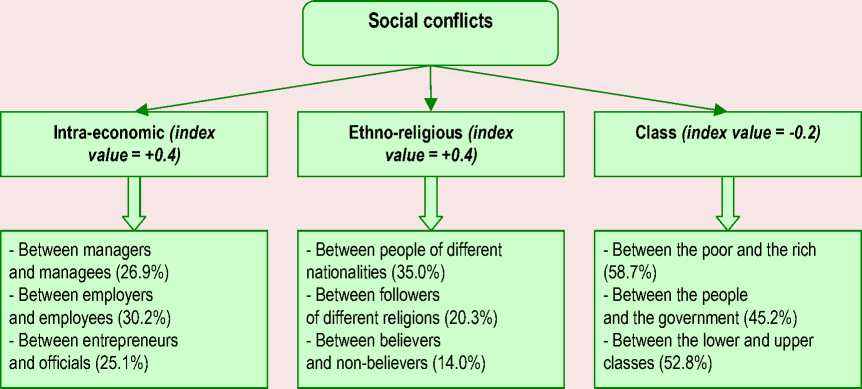
Note. Range of weights for factors (conflicts): economic – 0.84–0.66, ethno-religious – 0.85–0.69, class – 0.87–0.75.
The range of the conflict significance index is from “-1” (significant conflict) to “+1” (minor conflict or no conflict).
Compiled based on: (Levashov et al., 2024).
Figure 9. Index of Russians’ opinion on the trend in significant characteristics of Russia over the past 30 years and in the next 5 years
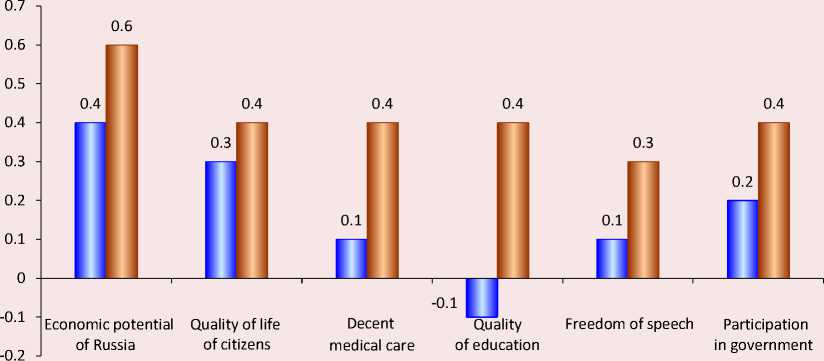
□ Trend for the last 30 years □ Trend for the next 5 years
Note. Interpretation of the trend index: “+1” – all Russians believe that this characteristic has changed / will change for the better; “-1” – all Russians believe that this characteristic has changed / will change for the worse.
Compiled based on: (Levashov et al., 2024).
is “0.0”). According to the public opinion, intra-economic and ethno-religious conflicts are insignificant, especially between believers and nonbelievers (index value is “+0.7”), although there is some tension in national relations (index value is “+0.1”).
The conditional forecast of the socio-political stability of the Russian society indicates that there is a moderately positive trend in the country’s characteristics important for citizens during the past 30 years, except for the assessment of the quality of education, which tends to decrease. The high probability of maintaining the stable legitimacy of the Russian state is evidenced by very optimistic forecast growth trends in the characteristics of public guarantees vital to the people – significant positive growth is predicted for all characteristics (Fig. 9).
Discussion and conclusions
-
A. General conclusions based on the generalization of empirical data
-
1. Based on the analysis of empirical information on the values of the main indicators of socio-political stability, it has been revealed that the trend of key indicators is positive . The stability of the structural and functional model of modern Russian society at the stage of the continuing search for optimal transformation of the socio-economic structure of the state is based on two factors: the shift toward the socially oriented state and the high trust of the Russian citizens in the RF President as the main guarantor of the effectiveness of social policy.
-
2. It follows from the attitude of the population toward current state policy that the stability of the Russian political system depends to a high degree
-
3. Currently, there are four factors in the Russian Federation that guarantee the sociopolitical stability of society: ethno-territorial; defense against a foreign enemy (the army); the current RF President (among Russians aged 18 and over, 72.4% believe that only Vladimir Putin can ensure the stable development of Russia in the future); social support by the state provided for in the Constitution. With the exception of elections, RF citizens participate in the political life of the state primarily as “spectators”.
on the social policy of the state, which should meet the principles of social justice, as well as on ideological priorities shared by the majority of the population, related to the common historical past and the traumatic experience of the transition to a liberal model of social order. The basis of a socially oriented state should be distributive relations that generate a sense of social justice and public trust in government institutions, ensuring a high level of legitimacy of the political system. To achieve this, a cost-effective socially oriented economy with a high level of labor productivity is required, capable of producing a high surplus value, or in economic terms, a large gross domestic product.
-
B. Analytical conclusions and hypotheses
-
4. One of the main theoretical hypotheses generated based on the analysis of research data from ISPR FCTAS RAS is as follows: currently, with capital concentration in the hands of a few owners through banks and transnational corporations, the market economy is functioning on the basis of constitutional and legal regulation, which organizes and standardizes state and public relations in order to arrange them, protect and develop stable socio-political progress in the interests of citizens. The Constitution declares the state to be the “will of the whole people”, but subsequently the conceptual and declarative provisions of the “main law” are specified in codified and subordinate acts that can be manipulated by lawmakers-lobbyists. In this case,
-
5. The lack of proactive citizenship among the employed population, the lack of awareness of their socio-political and socio-economic interests, rights and responsibilities hamper an effective dialogue between the state and civil society. Labor unions often act not as watchdogs of the interests of workers, but as partners of the employer, as “arbitrators” in the case of an industrial conflict, which prevents the economic dissatisfaction of workers from developing into political demands. For this reason, the population has little demand for political parties (only 26.2% of citizens trust them). The political system of the state appears to be pseudomarket, i.e. eclectic, playing the role of a “guardian” for both employees and the business community, which also receives subsidies from the state due to the crisis.
-
6. It is generally accepted that the main criterion of a market state is the dominance of legal regulation of public relations, when the priority of law ensures social balance. We consider the low assessment of the functioning of the rule-of-law state by citizens (54% of respondents believe that the state does not ensure the implementation of the principle of equality before the courts and the law) as another risk of delegitimization and destabilization of the political system.
-
7. Another significant factor guaranteeing the stability of society is the economic one, which presupposes the objective existence of a place for a citizen in the social division of labor and a share in the social product. At the same time, the functioning of the consumer society, predicted by the Austro-American economist and sociologist Joseph Schumpeter (Schumpeter, 2007), displaces the political content of ideology, replacing it with
-
8. Given the contradictions in the development of the political system of modern Russia, the insufficient functional maturity of civil society institutions, representative and judicial branches
of government, it seems advisable to minimize threats to the stability of society and the state by rebalancing the coordination of plans and activities between different branches of government, providing constant feedback from the population, improving legislation considering requests to increase the level of political and legal culture of citizens (Kerimov, 2015). Russians are generally optimistic about the stable development of the state in the coming five years, and this is an important indicator and criterion of the legitimacy of the state. However, citizens’ optimism will remain only if the state respects the priority of social guarantees, in particular, significantly improves the quality and accessibility of education and medical care. Also, at least a moderate increase in the welfare of citizens should be guaranteed, and political risks will not be critically relevant in public opinion.
the substitution of the inviolable principles of the Constitution for “precedent” variable market laws seems to become legitimate. At the same time, the vast majority of Russians do not accept the capitalist state system, which limits the possibility of legitimizing it.
consumer advertising, stimulating the consumption of wanted and unwanted products. On this basis, the main ideological instrument of the market state, the supporting “staple” of society, is consumer ideology. There is a “formalization” of personality due to the displacement of its social identity by material identity. The uniqueness of social connections is lost, they are replaced by the universality of globalized material consumption. As a result, we see the alienation of the individual from community, the replacement of spiritual values by material values, and the dependence of the socio-political stability of the state solely on satisfaction with the material aspects of life.

